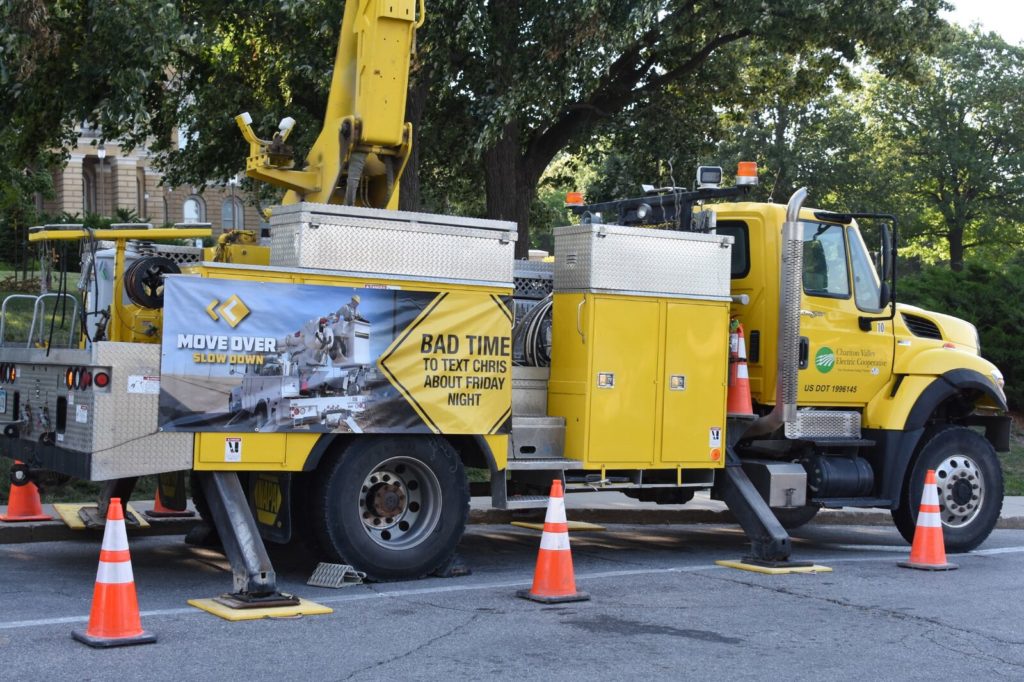
In his decades of experience as a lead electric cooperative lineman, Cal Wolterman has had more than his share of close calls with motorists zipping by work sites on highways.
Take the time Wolterman, his crew and their bucket truck from Estherville-based Iowa Lakes Electric Cooperative were sandwiched between two speeding vehicles on a two-lane highway in northern Iowa. They had blocked off a lane when a tractor-trailer and another vehicle approached from opposite directions.
“Instead of one vehicle waiting to use the other lane, they both used the other lane and the shoulder to go around our truck, barely missing the outrigger on the truck,” said Wolterman, who escaped without injury. “We’ll have signs and cones up, and we’ll have a guy out there with a ‘slow’ sign, and they’ll still fly by us at 60 miles per hour.”
Signs and orange cones have failed. But Iowa electric utilities are hoping penalties under the state’s new “Move Over or Slow Down” law will do the job.
The law, which took effect July 1, expands a 2002 law that covered emergency vehicles by imposing fines and penalties for failure to change lanes or reduce speed when passing utility vehicles.
“I sure hope people abide by it, move over and slow down,” said Wolterman. “It’s kind of crazy out there.”
Electric utilities launched a campaign to promote the law and are taking extra steps to make sure it sinks fully into people’s consciences. A news conference featuring Iowa Gov. Kim Reynolds kicked off the effort, along with catchy signs promoting the campaign on the sides of utility vehicles.
Organizers want to get at “why a driver wouldn’t instinctively move over or slow down when approaching a stationary utility vehicle with flashing lights,” said Erin Campbell, director of communications at the Iowa Association of Electric Cooperatives in Des Moines.
“We want to proactively change drivers’ behavior to prevent close calls or incidents from happening in the first place,” said Campbell.
Drivers can go to the Move Over website for information and sign an online pledge that shows “they are consciously making a decision to alter their behavior by agreeing to move over or slow down,” said Campbell.
And for behind-the-wheel multi-taskers, organizers use a humorous touch with ads that utilities can customize on various outlets. “Bad time to search for those missing Skittles” reads one ad. “Bad time to text Chris about Friday night” reads another.
While all states have “move over” laws, about a dozen specifically protect utility service vehicles. Missouri Gov. Eric Greitens recently signed a measure to add utility vehicles to a list of other emergency vehicles for which motorists must pull over. It takes effect Aug. 28.
Co-ops without protections for utility service vehicles aren’t waiting for their legislatures to act. They are helping each other.
The Association of Louisiana Electric Cooperatives in Baton Rouge created “Hang Up and Drive. Lives are on the Line,” a multimedia campaign and video to combat texting and driving. Its efforts have inspired co-ops in Pennsylvania and New Jersey to take action.
Line crews at Sussex Rural Electric Cooperative in Sussex, New Jersey, have affixed ALEC-designed bumper stickers on trucks. And Claverack REC in Wysox, Pennsylvania, designed an on-screen ad for local movie theaters with a no texting and driving message and is considering creating its own video.
Line crews hope the focus on driver conduct helps because the problem is getting worse.
In the ALEC video, an apprentice lineman from Beauregard Electric Cooperative in DeRidder, describes a scene that’s increasingly familiar to line crews.
“We’re set up on [the] side of [the] road, we’ve got our cones out, our lights are flashing, maybe we have a lane of traffic blocked, and yet we have a distracted driver either texting or flying right by us. We have to worry about them and still continue to do our job,” said the co-op’s John Hobbs.
Victoria A. Rocha is a staff writer at NRECA.